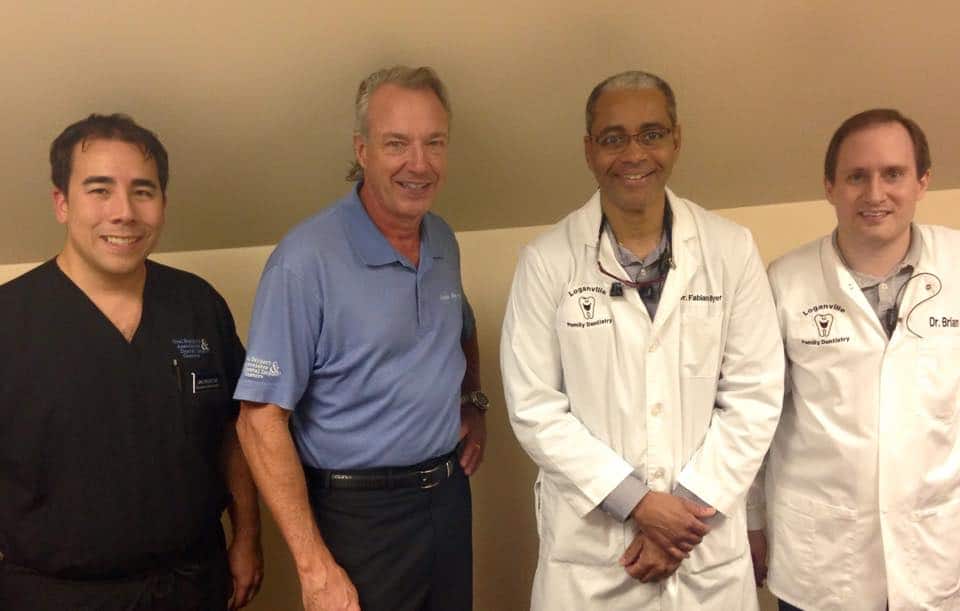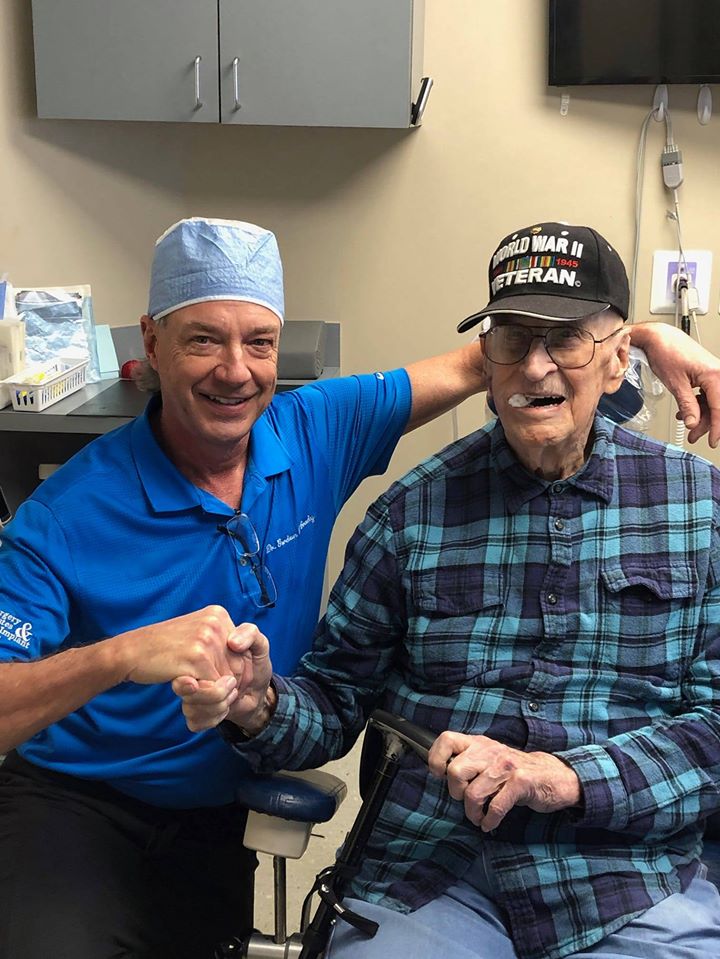Dr. Brady has practiced at Oral Surgery Associates and Dental Implant Centers for more than 30 years. He received his DMD degree from the Medical College of Georgia in 1976 and graduated first in his class. He also completed an internship in anesthesiology and a residency in oral and maxillofacial surgery at the Medical College of Georgia. As a result of his extensive training and cutting-edge methods with dental implants, Dr. Brady has been a speaker at many major dental meetings, such as the Georgia and South Carolina Oral and Maxillofacial Surgery Associations, Northern District Dental Society, and multiple local dental study groups. He lectures at annual Thomas P. Hinman Dental Meetings and was a featured clinician at the 2011 meeting.
Expertise
As an accomplished oral surgeon, Dr. Brady uses the most advanced techniques. His expertise includes:
- Dental implants using ICAT-3D imaging for implant-guided surgery
- Bone grafting using Bone Morphogenic Protein (BMP), the latest in bone regenerative products.
- Specializes and has helped perfect procedures in the highly advanced techniques of placing Zygomatic and Pterygoid implants during Teeth-in-an-Hour and Teeth-in-a-Day surgeries. These advanced techniques often allow patients to avoid extensive bone grafting.
- Wisdom teeth extraction
- Dental alveolar surgery
- Treatment of oral pathology
- Reconstructive surgery
Certification
- Fellow of the American Board of Oral and Maxillofacial Surgery
- Advanced Cardiac Life Support
Memberships
- Association of Oral and Maxillofacial Surgery
- American Dental Association
- American Dental Society of Anesthesiology
- Georgia Society of Oral and Maxillofacial Surgery
Dental Implants
Dental implants are the most effective and longest-lasting solution for replacing missing teeth. They have the same look, feel, and function as healthy natural teeth. At Oral Surgery Associates & Dental Implant Centers in Atlanta, we’ll provide you with durable options for tooth replacement that will help you smile with confidence.
A dental implant is an artificial tooth root, usually made of titanium. A complete dental implant has three components:
- Implant – a titanium root form that is surgically placed into the jawbone
- Abutment – a connector, placed on top the implant root form before a crown is secured to it
- Crown – a restoration to replace the visible, white portion of your tooth
One of our oral surgeons will place the implant and the abutment, and your general dentist will place the crown.
The Dental Implant Process
High-quality implants can last a lifetime. Our oral surgeons adhere to the highest standards to ensure you get optimal results.
- Consultation and treatment plan – We start the process by ensuring you’re a candidate for this treatment. We’ll take 3-D images of your facial structures and teeth and thoroughly review your medical and dental histories. You’ll receive a thorough explanation of your treatment options and what you can expect from each of them. After you choose an option, we’ll provide a treatment plan that matches your goals for your oral health and your budget.
- Extraction – If you have a damaged tooth that needs to be extracted, it may be possible to immediately replace it with a dental implant. At times, bone grafting is required before placing the implant.
- Bone grafting – When a tooth is missing, your body will begin to resorb the bone from that space. Studies show that within one year of tooth loss, there is a 25% decrease in bone width. If you don’t act quickly, the bone can shrink so much that it won’t support a dental implant. Bone grafting is needed to provide support for a dental implant. We allow four to six months for the graft to heal before placing the implant.
- Dental implant surgery – You will be anesthetized to ensure your comfort throughout the surgery. A small incision will be made, and the implant will be placed in the bone. The procedure takes one to two hours.
- Osseointegration – After we place the implant, we will cover it with the surrounding soft tissue. We allow a healing period of three to four months for the implant and bone to fully integrate.
- Final restoration – After the healing period, we will check the implant site to ensure osseointegration is complete. An abutment is placed on the implant to connect with the restoration or dental crown. Your general dentist will place the crown.
Bone Grafting
The bone grafting process rebuilds deteriorated bone. Donor bone is grafted in the jaw before dental implants are placed. The graft encourages the body to grow its own bone.
Minor Bone Grafting
Most bone grating procedures are minor. Minor grafting is commonly used to build up bone in preparation for a dental implant.
Major Bone Grafting
If there is significant bone loss due to trauma, cysts, tumors, or a defect, major bone grafting might be required. Additional materials, technologies, and several specialists might be involved to complete the procedure.
Where does the new bone come from?
Common donor sites come from your own body, including:
- Chin
- Hip
- Leg
- Skull
Sometimes bone-grafting materials are sourced from bovine (cow) or human cadavers. In advance of your procedure, one of our doctors will explain the pros and cons of each source.
Tooth Extractions
Some teeth are extracted because they are severely decayed; others may have advanced periodontal disease, or have broken in a way that cannot be repaired. Other teeth may need removal because they are poorly positioned in the mouth (such as impacted teeth), or in preparation for orthodontic treatment. The removal of a single tooth can lead to problems related to your chewing ability, problems with your jaw joint, and shifting teeth, which can have a major impact on your dental health.
The Tooth Extraction Process
At the time of extraction the doctor will need to numb your tooth, jaw bone and gums that surround the area with a local anesthetic. During the extraction process you will feel a lot of pressure. This is from the process of firmly rocking the tooth in order to widen the socket for removal. You feel the pressure without pain as the anesthetic has numbed the nerves stopping the transference of pain, yet the nerves that transmit pressure are not profoundly affected. If you do feel pain at any time during the extraction please let us know right away.
Sectioning a Tooth
Some teeth require sectioning. This is a very common procedure done when a tooth is so firmly anchored in its socket or the root is curved and the socket can’t expand enough to remove it. The doctor simply cuts the tooth into sections then removes each section one at a time.
After Tooth Extraction
For details on home care after a tooth extraction, see the page “PRE & POST OP INSTRUCTIONS” under “Post op- After tooth extraction”.
Will my insurance pay for implants?
Many insurance companies are now starting to cover dental implants. Every patient’s insurance plan is unique, and we always recommend patients call their insurance companies to see if they have coverage for dental implants. As a courtesy, we will also check your insurance after your initial consultation.
Are dental implants as strong as natural teeth?
Dental Implants are the most dependable recourse for tooth restoration. Once the implant is fully healed, patients can usually enjoy all of their favorite foods while benefiting from healthy, aesthetically-pleasing dental implants.
What are the benefits of dental implants?
1. Having the most natural look and feel of teeth.
2. Prevention of bone loss.
3. Having the ability to chew your food again.
4. Durability
5. Improved self-esteem and improved oral health
How successful are dental implants?
The success rates of dental implants can vary, but in general dental implants can endure for a long time. Some studies have even shown dental implants lasting longer than 20 years.
How long does it take for the implant process?
The implant process usually varies per patient. If you are a candidate for dental implants without bone grafting, the healing process usually takes about 3-4 months. After you are cleared by the oral surgeon, you are released to your general dentist so they can put on the crown. If you are needing extractions, and bone grafting the total time from start to finish can take about 6-8 months.
Am I candidate for dental implants?
Every person is a case by case basis. Our ideal candidate would be in good oral health. The healthier an individual’s gum tissue is, the more support the implants will have.
Will one doctor do everything?
Usually, a dental surgeon places the implant(s) and performs other necessary surgical procedures – your general dentist provides the temporary and permanent replacement teeth. Both doctors are involved in planning your dental treatment. Also, depending upon a variety of factors, different dental specialists may help with your dental care.
How many implants do I need?
Typically, one implant per missing tooth is placed. Due to the fact that the larger teeth in the back of your jaws have two or three roots, the most common approach is to replace missing back teeth with larger implants.
Is age a factor?
No, there isn’t any restrictions for age. When you come in for a consultation the doctor will discuss what your best options are.





